当孔子遇到苏格拉底(英文)
- 格式:docx
- 大小:14.20 KB
- 文档页数:1
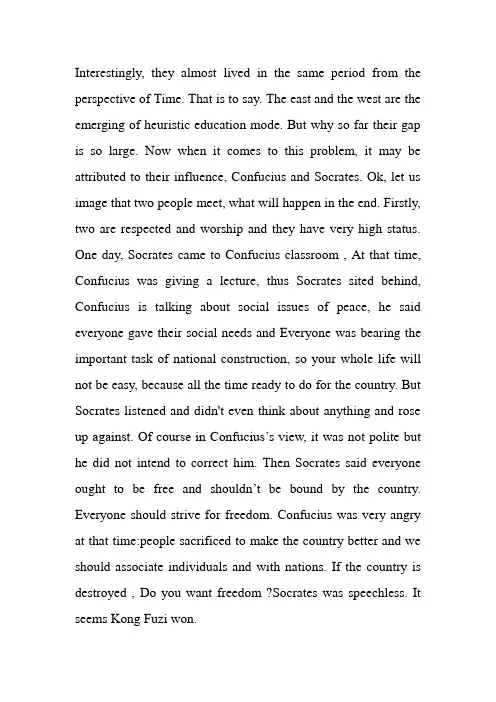
Interestingly, they almost lived in the same period from the perspective of Time. That is to say. The east and the west are the emerging of heuristic education mode. But why so far their gap is so large. Now when it comes to this problem, it may be attributed to their influence, Confucius and Socrates. Ok, let us image that two people meet, what will happen in the end. Firstly, two are respected and worship and they have very high status. One day, Socrates came to Confucius classroom , At that time, Confucius was giving a lecture, thus Socrates sited behind, Confucius is talking about social issues of peace, he said everyone gave their social needs and Everyone was bearing the important task of national construction, so your whole life will not be easy, because all the time ready to do for the country. But Socrates listened and didn't even think about anything and rose up against. Of course in Confucius’s view, it was not polite but he did not intend to correct him. Then Socrates said everyone ought to be free and shouldn’t be bound by the country. Everyone should strive for freedom. Confucius was very angry at that time:people sacrificed to make the country better and we should associate individuals and with nations. If the country is destroyed , Do you want freedom ?Socrates was speechless. It seems Kong Fuzi won.。
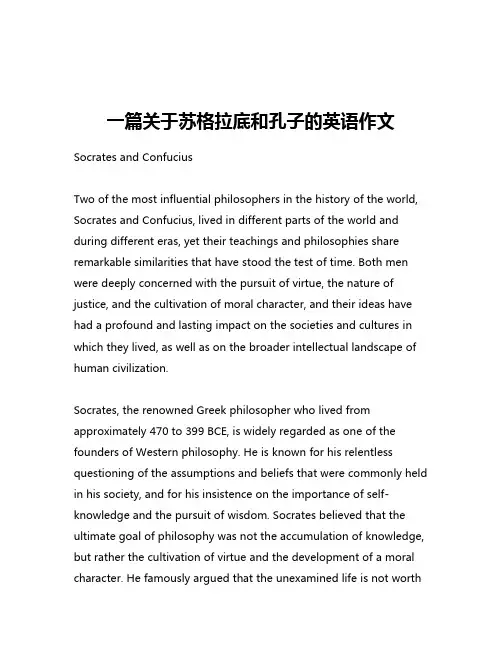
一篇关于苏格拉底和孔子的英语作文Socrates and ConfuciusTwo of the most influential philosophers in the history of the world, Socrates and Confucius, lived in different parts of the world and during different eras, yet their teachings and philosophies share remarkable similarities that have stood the test of time. Both men were deeply concerned with the pursuit of virtue, the nature of justice, and the cultivation of moral character, and their ideas have had a profound and lasting impact on the societies and cultures in which they lived, as well as on the broader intellectual landscape of human civilization.Socrates, the renowned Greek philosopher who lived from approximately 470 to 399 BCE, is widely regarded as one of the founders of Western philosophy. He is known for his relentless questioning of the assumptions and beliefs that were commonly held in his society, and for his insistence on the importance of self-knowledge and the pursuit of wisdom. Socrates believed that the ultimate goal of philosophy was not the accumulation of knowledge, but rather the cultivation of virtue and the development of a moral character. He famously argued that the unexamined life is not worthliving, and he spent much of his time engaged in dialogues and debates with his fellow citizens, challenging them to think critically about their values and beliefs.One of the key tenets of Socratic philosophy was the idea of the "Socratic method," a form of inquiry in which the philosopher would pose a series of questions to his interlocutor in order to gradually uncover the flaws and inconsistencies in their reasoning. Through this process, Socrates aimed to help his followers achieve a deeper understanding of the nature of truth and justice, and to inspire them to continually question and refine their own beliefs and assumptions.Confucius, on the other hand, was a Chinese philosopher who lived from approximately 551 to 479 BCE, several decades after the time of Socrates. Like Socrates, Confucius was deeply concerned with the cultivation of moral character and the promotion of social harmony. He believed that the key to a well-ordered and prosperous society lay in the cultivation of virtues such as benevolence, righteousness, propriety, and filial piety.Confucius' teachings were centered around the idea of the "Mandate of Heaven," the belief that the legitimacy of a ruler or government was derived from its ability to uphold the moral and ethical principles that were seen as divinely ordained. He argued that the primary responsibility of a ruler was to set an example of moral andethical behavior for his subjects, and to create a social and political system that would encourage the cultivation of these virtues.One of the central tenets of Confucian philosophy was the idea of the "Five Relationships," which outlined the hierarchical and reciprocal obligations that should govern the interactions between different members of society. These relationships included those between ruler and subject, father and son, husband and wife, elder and younger, and friend and friend. Confucius believed that by fulfilling these obligations and maintaining these relationships, individuals and societies could achieve a high degree of social harmony and moral order.While Socrates and Confucius lived in very different cultural and historical contexts, there are a number of striking similarities between their philosophies and teachings. Both men were deeply concerned with the cultivation of moral character and the promotion of social harmony, and both believed that the pursuit of wisdom and virtue should be the primary goal of the individual and the state.Both Socrates and Confucius also placed a strong emphasis on the importance of education and the role of the teacher in the intellectual and moral development of their students. Socrates was known for his Socratic dialogues, in which he would engage in a process of questioning and inquiry with his followers in order to helpthem develop a deeper understanding of the world around them. Similarly, Confucius was renowned for his role as a teacher and mentor, and his teachings were transmitted and preserved through the generations by his devoted followers.Furthermore, both Socrates and Confucius were deeply critical of the political and social systems of their time, and they used their philosophical teachings as a means of challenging the prevailing norms and values of their respective societies. Socrates was ultimately condemned to death for his perceived subversion of the Athenian state, while Confucius spent much of his life seeking to influence the rulers of his time and promote a more just and ethical system of government.Despite these similarities, there are also some important differences between the philosophies of Socrates and Confucius. Socrates was primarily concerned with the pursuit of universal truths and the development of a rational and logical approach to understanding the world, while Confucius was more focused on the practical application of ethical principles in the context of social and political relationships.Moreover, while Socrates was deeply skeptical of the idea of divineor metaphysical forces, Confucius' teachings were heavily influenced by the concept of the "Mandate of Heaven" and the belief in a higher moral order that governed the universe.Ultimately, however, the teachings and philosophies of Socrates and Confucius share a common thread in their emphasis on the importance of moral character, the cultivation of virtue, and the pursuit of wisdom. Both men have had a profound and enduring impact on the intellectual and cultural landscapes of their respective societies, and their ideas continue to be studied and debated by scholars and thinkers around the world.。
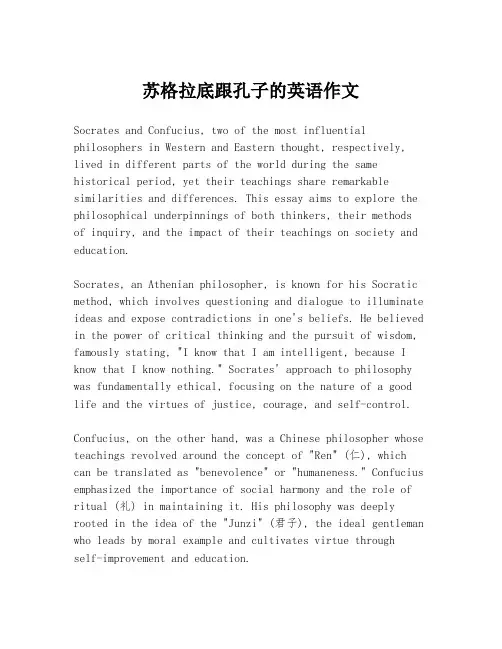
苏格拉底跟孔子的英语作文Socrates and Confucius, two of the most influential philosophers in Western and Eastern thought, respectively, lived in different parts of the world during the same historical period, yet their teachings share remarkable similarities and differences. This essay aims to explore the philosophical underpinnings of both thinkers, their methods of inquiry, and the impact of their teachings on society and education.Socrates, an Athenian philosopher, is known for his Socratic method, which involves questioning and dialogue to illuminate ideas and expose contradictions in one's beliefs. He believed in the power of critical thinking and the pursuit of wisdom, famously stating, "I know that I am intelligent, because I know that I know nothing." Socrates' approach to philosophy was fundamentally ethical, focusing on the nature of a good life and the virtues of justice, courage, and self-control.Confucius, on the other hand, was a Chinese philosopher whose teachings revolved around the concept of "Ren" (仁), which can be translated as "benevolence" or "humaneness." Confucius emphasized the importance of social harmony and the role of ritual (礼) in maintaining it. His philosophy was deeply rooted in the idea of the "Junzi" (君子), the ideal gentleman who leads by moral example and cultivates virtue throughself-improvement and education.Both Socrates and Confucius valued the role of education in shaping individuals and societies. Socrates encouraged his students to think for themselves, fostering a spirit of inquiry that would lead to self-awareness and moral growth. Similarly, Confucius advocated for the education of the masses, believing that knowledge and virtue could be taught and that everyone had the potential to improve themselves.However, their methods of teaching and their views on therole of the individual in society were distinct. Socrates' approach was more confrontational and individualistic, challenging his students to question everything, including the established norms and values of Athenian society. Confucius, in contrast, placed a greater emphasis on social order and the importance of adhering to traditional roles and rituals, which he saw as essential for maintaining harmony.The impact of their teachings has been profound and enduring. Socratic thought laid the groundwork for Western philosophy, influencing figures such as Plato and Aristotle, and continues to be a cornerstone of Western intellectual tradition. Confucianism, meanwhile, has shaped the social and political structures of China and other East Asian countries for centuries, with its emphasis on moral leadership and the importance of education.In conclusion, while Socrates and Confucius approached philosophy from different cultural perspectives, they both sought to guide individuals towards a life of virtue and wisdom. Their teachings have left an indelible mark on the development of human thought and continue to influenceethical and educational discourse today. Despite their differences, they share a common goal: to cultivate a society of thoughtful, virtuous individuals who strive for the betterment of themselves and their communities.。
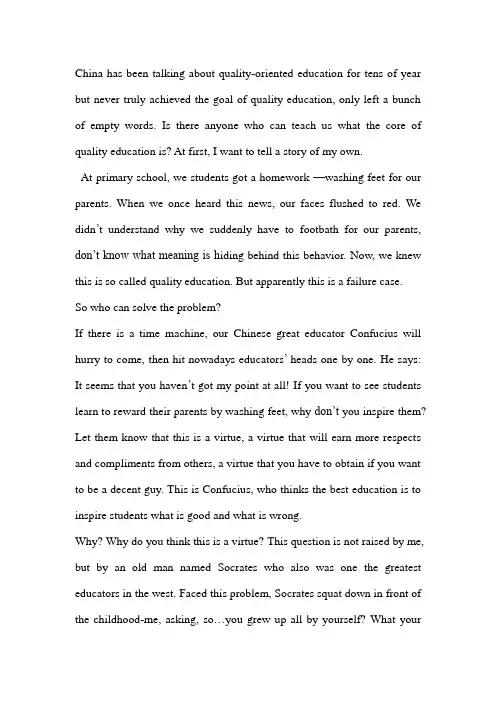
China has been talking about quality-oriented education for tens of year but never truly achieved the goal of quality education, only left a bunch of empty words. Is there anyone who can teach us what the core of quality education is? At first, I want to tell a story of my own.At primary school, we students got a homework —washing feet for our parents. When we once heard this news, our faces flushed to red. We didn’t understand why we suddenly have to footbath for our parents, don’t know what meaning is h iding behind this behavior. Now, we knew this is so called quality education. But apparently this is a failure case.So who can solve the problem?If there is a time machine, our Chinese great educator Confucius will hurry to come, then hit nowadays educators’ heads one by one. He says: It seems that you haven’t got my point at all! If you want to see students learn to reward their parents by washing feet, why don’t you inspire them? Let them know that this is a virtue, a virtue that will earn more respects and compliments from others, a virtue that you have to obtain if you want to be a decent guy. This is Confucius, who thinks the best education is to inspire students what is good and what is wrong.Why? Why do you think this is a virtue? This question is not raised by me, but by an old man named Socrates who also was one the greatest educators in the west. Faced this problem, Socrates squat down in front of the childhood-me, asking, so…you grew up all by yourself? What yourparents have done for you? What you can do for them? How about a footbath? This is totally Socrates, he never tells students to do what he thinks is right but lead them thinking whether it’s right or not.If Socrates and Confucius really meet one day, though arguments will inevitably exist, they will at last shake hands. Because they all share one principle on the quality education: teaching students to be a decent man with virtue by leading them to understand reason rather than simply tell them.Later, I tended to discover the answer of quality education through the Internet. And I found out more than 4 million articles relating to it, but none of them had really worked out. So, why don’t we think about the way that these two greatest educators suggested, maybe, one day, the goal of quality education will finally come true.。
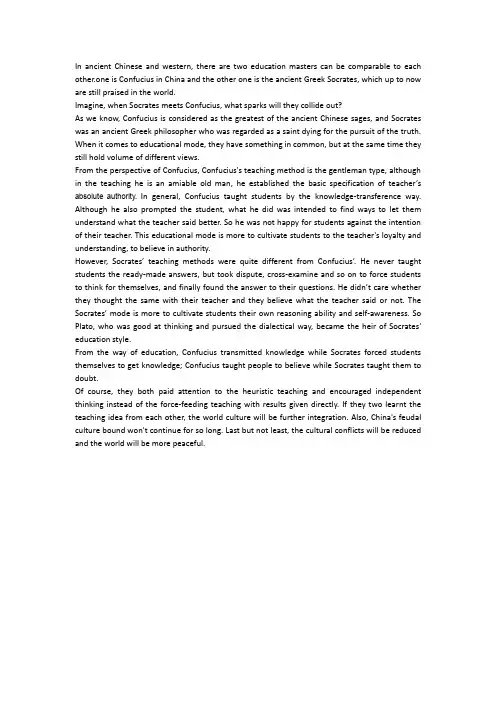
In ancient Chinese and western,there are two education masters can be comparable to each other.one is Confucius in Chinaand the other one is the ancient Greek Socrates, which up to now are still praised in the world.Imagine, when Socrates meets Confucius, what sparks will they collide out?As we know, Confucius is considered as the greatest of the ancient Chinese sages, and Socrates was an ancient Greek philosopher who was regarded as a saint dying for the pursuit of the truth. When it comes to educational mode, they have something in common, but at the same time they still hold volume of different views.From the perspective of Confucius, Confucius's teaching method is the gentleman type, although in the teaching he is an amiable old man,he established the basic specification of teacher’s absolute authority.In general, Confucius taught studentsby theknowledge-transference way. Although he also prompted the student, what he did was intended to find ways to let them understand what the teacher said better.So he was not happy for students against the intention of their teacher.This educational mode ismore to cultivate students to the teacher's loyalty and understanding, to believe in authority.However, Socrates’teaching methods were quite different from Co nfucius’. He never taught studentsthe ready-made answers, buttookdispute, cross-examine and so on to force students to think for themselves, and finally found the answer to their questions.He didn’t care whether they thought the same with their teacher and they believe what the teacher saidor not.The Socrates’mode is more to cultivate students their own reasoning ability and self-awareness. So Plato, whowas good at thinking and pursued the dialectical way, became the heir of Socrates' education style.From the way of education, Confucius transmitted knowledge while Socrates forced students themselves to get knowledge;Confucius taught people to believe while Socrates taughtthem to doubt.Of course, they both paid attention to the heuristic teaching and encouraged independent thinking instead of the force-feeding teaching with results given directly. If they two learnt the teaching idea from each other, the world culture will be further integration.Also, China's feudal culture bound won't continue for so long. Last but not least, the cultural conflicts will be reduced and the world will be more peaceful.。
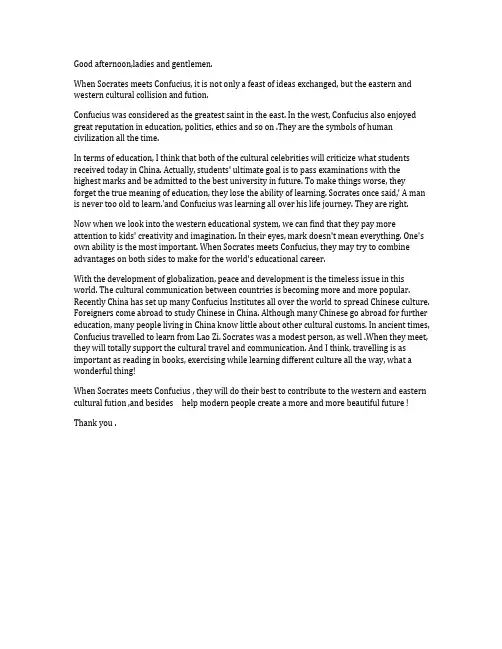
Good afternoon,ladies and gentlemen.When Socrates meets Confucius, it is not only a feast of ideas exchanged, but the eastern and western cultural collision and fution.Confucius was considered as the greatest saint in the east. In the west, Confucius also enjoyed great reputation in education, politics, ethics and so on .They are the symbols of human civilization all the time.In terms of education, I think that both of the cultural celebrities will criticize what students received today in China. Actually, students' ultimate goal is to pass examinations with the highest marks and be admitted to the best university in future. To make things worse, they forget the true meaning of education, they lose the ability of learning. Socrates once said,' A man is never too old to learn.’and Confucius was learning all over his life journey. They are right. Now when we look into the western educational system, we can find that they pay more attention to kids' creativity and imagination. In their eyes, mark doesn't mean everything. One's own ability is the most important. When Socrates meets Confucius, they may try to combine advantages on both sides to make for the world's educational career.With the development of globalization, peace and development is the timeless issue in this world. The cultural communication between countries is becoming more and more popular. Recently China has set up many Confucius Institutes all over the world to spread Chinese culture. Foreigners come abroad to study Chinese in China. Although many Chinese go abroad for further education, many people living in China know little about other cultural customs. In ancient times, Confucius travelled to learn from Lao Zi. Socrates was a modest person, as well .When they meet, they will totally support the cultural travel and communication. And I think, travelling is as important as reading in books, exercising while learning different culture all the way, what a wonderful thing!When Socrates meets Confucius , they will do their best to contribute to the western and eastern cultural fution ,and besides help modern people create a more and more beautiful future ! Thank you .。
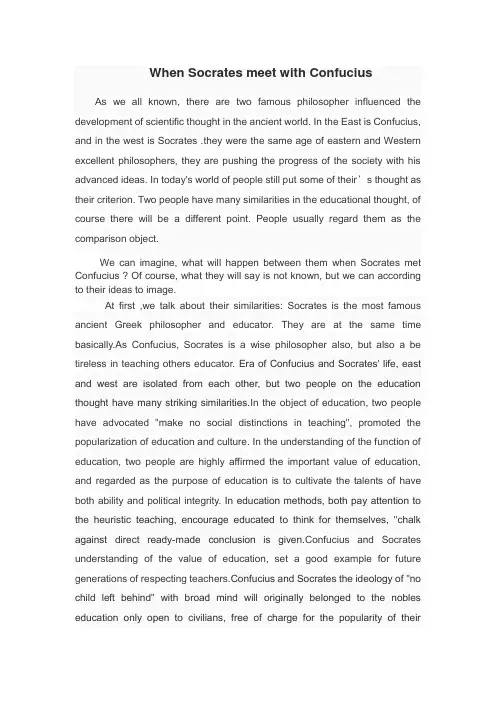
When Socrates meet with Confucius As we all known, there are two famous philosopher influenced the development of scientific thought in the ancient world. In the East is Confucius, and in the west is Socrates .they were the same age of eastern and Western excellent philosophers, they are pushing the progress of the society with his advanced ideas. In today's world of people still put some of their’s thought as their criterion. Two people have many similarities in the educational thought, of course there will be a different point. People usually regard them as the comparison object.We can imagine, what will happen between them when Socrates met Confucius ? Of course, what they will say is not known, but we can according to their ideas to image.At first ,we talk about their similarities: Socrates is the most famous ancient Greek philosopher and educator. They are at the same time basically.As Confucius, Socrates is a wise philosopher also, but also a be tireless in teaching others educator. Era of Confucius and Socrates' life, east and west are isolated from each other, but two people on the education thought have many striking similarities.In the object of education, two people have advocated "make no social distinctions in teaching", promoted the popularization of education and culture. In the understanding of the function of education, two people are highly affirmed the important value of education, and regarded as the purpose of education is to cultivate the talents of have both ability and political integrity. In education methods, both pay attention to the heuristic teaching, encourage educated to think for themselves, "chalk against direct ready-made conclusion is given.Confucius and Socrates understanding of the value of education, set a good example for future generations of respecting teachers.Confucius and Socrates the ideology of "no child left behind" with broad mind will originally belonged to the nobles education only open to civilians, free of charge for the popularity of theirrespective national education at that time and the spread of culture has played an indelible contribution.Different points:Because of their different social classes, so they on behalf of the interests of different also.Confucius is the etiquette service for ancient slavery to restore week, Socrates was however in order to save Athens democracy of Athens。
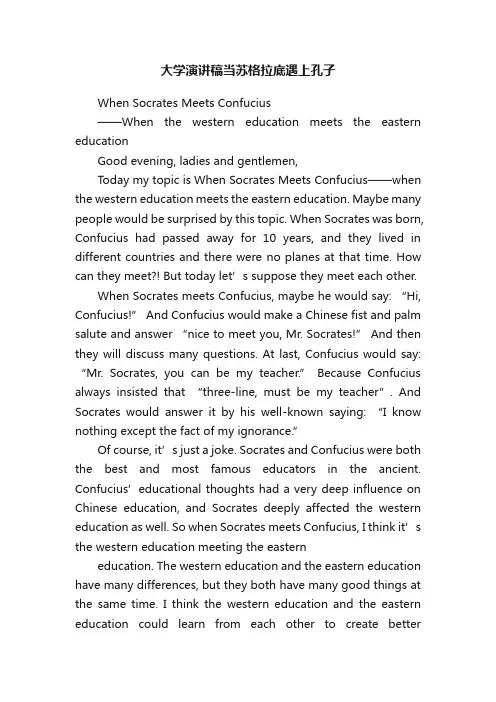
大学演讲稿当苏格拉底遇上孔子When Socrates Meets Confucius——When the western education meets the eastern educationGood evening, ladies and gentlemen,Today my topic is When Socrates Meets Confucius——when the western education meets the eastern education. Maybe many people would be surprised by this topic. When Socrates was born, Confucius had passed away for 10 years, and they lived in different countries and there were no planes at that time. How can they meet?! But today let’s suppose they meet each other.When Socrates meets Confucius, maybe he would say: “Hi, Confucius!” And Confucius would make a Chinese fist and palm salute and answer “nice to meet you, Mr. Socrates!” And then they will discuss many questions. At last, Confucius would say: “Mr. Socrates, you can be my teacher.” Because Confucius always insisted that “three-line, must be my teacher”. And Socrates would answer it by his well-known saying: “I know nothing except the fact o f my ignorance.”Of course, it’s just a joke. Socrates and Confucius were both the best and most famous educators in the ancient. Confucius’educational thoughts had a very deep influence on Chinese education, and Socrates deeply affected the western educat ion as well. So when Socrates meets Confucius, I think it’s the western education meeting the easterneducation. The western education and the eastern education have many differences, but they both have many good things at the same time. I think the western education and the eastern education could learn from each other to create bettereducational methods.Yes, there’s already some communication between the western education and the eastern education, and it has promoted educational development. But I think it is still not enough. We need more communication.Education is the guider of culture. The western education leads the western culture and the eastern education leads the eastern culture. So, if we fuse the western education and the eastern education together, it would be a kind of new education, and it will create a new world culture and make our world more harmonious.When Socrates meets Confucius, when the western education meets the eastern education and be fused together, it would become t he Socrat es and Confucius’ Education——let’s call it as the New World Education! I believe this New World Education will make our world better and better!So, let’s make Socrates meet Confucius!。
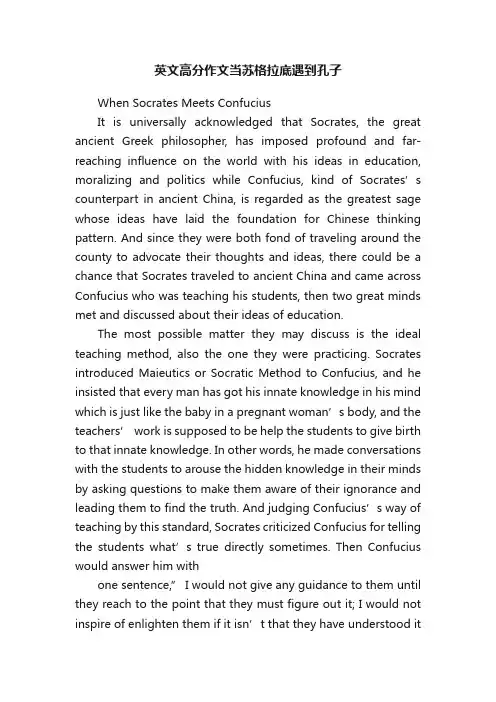
英文高分作文当苏格拉底遇到孔子When Socrates Meets ConfuciusIt is universally acknowledged that Socrates, the great ancient Greek philosopher, has imposed profound and far-reaching influence on the world with his ideas in education, moralizing and politics while Confucius, kind of Socrates’s counterpart in ancient China, is regarded as the greatest sage whose ideas have laid the foundation for Chinese thinking pattern. And since they were both fond of traveling around the county to advocate their thoughts and ideas, there could be a chance that Socrates traveled to ancient China and came across Confucius who was teaching his students, then two great minds met and discussed about their ideas of education.The most possible matter they may discuss is the ideal teaching method, also the one they were practicing. Socrates introduced Maieutics or Socratic Method to Confucius, and he insisted that every man has got his innate knowledge in his mind which is just like the baby in a pregnant woman’s body, and the teachers’ work is supposed to be help the students to give birth to that innate knowledge. In other words, he made conversations with the students to arouse the hidden knowledge in their minds by asking questions to make them aware of their ignorance and leading them to find the truth. And judging Confucius’s way of teaching by this standard, Socrates criticized Confucius for telling the students what’s true directly sometimes. Then Confucius would answer him withone sentence,” I would not give any guidance to them until they reach to the point that they must figure out it; I would not inspire of enlighten them if it isn’t that they have understood itbut can’t express it correctly and completely; I would give them no more examples if they can’t draw inferences about other cases from one instance ”. Here, both of them f ocus on enlightenment. Socratic Method is based on the presumption the students acquire knowledge in the very way he has assumed, i.e. like pregnant women giving birth to babies, but actually students acquire knowledge in various ways, we can’t simply imag ine or take it as granted that they all learn things in the same way, and treat them with one teaching strategy.And that brings them to the next question--educating students in accordance with their aptitude and cognitive rules.Confucius started by tell one example: both his students Zilu and Ranyou came to ask him that when they heard something whether they should put it into practice immediately, and he told Zilu not to practice it while he encouraged Ranyou to do it. He explained that Zilu was an adventurous man, so I told him to be cautious, but Ranyou was a little timid, so I encouraged him. Confucius pointed out that he got to know his students better though observing them and talking with them, and then he gave guidance to them according to his understanding of their aptitude. And when Socrates wanted to justify himself by saying that his Maieutics didhelp to arouse the students’innate intelligence, Confucius could make him speechless by asking,"what if the student shakes his head in answer to all q uestions? You still don’t give him a clue?"Indeed, different students follow the different cognitive pattern when they approach the world around them. Today we have many different theories with regard to the human cognition such as Theory of Tabula Rasa and Constructivism, we can not tell which one is right or wrong, because the only way tojudge them is whether it is suitable for the individuals. Teachers in the modern society should bear in mind that there is no fixed teaching method, so we should apply flexibly different teaching methods to deal with different students based on an in-depth understanding of their cognitive style.。
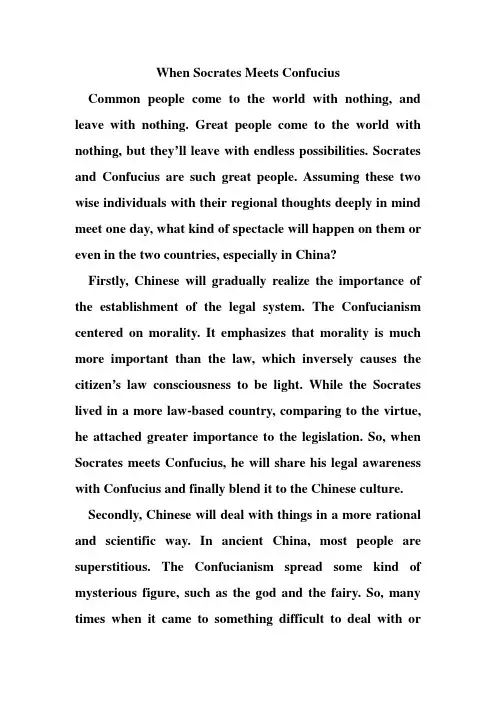
When Socrates Meets ConfuciusCommon people come to the world with nothing, and leave with nothing. Great people come to the world with nothing, but they’ll leave with endless possibilities. Socrates and Confucius are such great people. Assuming these two wise individuals with their regional thoughts deeply in mind meet one day, what kind of spectacle will happen on them or even in the two countries, especially in China?Firstly, Chinese will gradually realize the importance of the establishment of the legal system. The Confucianism centered on morality. It emphasizes that morality is much more important than the law, which inversely causes the citizen’s law consciousness to be light. While the Socrates lived in a more law-based country, comparing to the virtue, he attached greater importance to the legislation. So, when Socrates meets Confucius, he will share his legal awareness with Confucius and finally blend it to the Chinese culture. Secondly, Chinese will deal with things in a more rational and scientific way. In ancient China, most people are superstitious. The Confucianism spread some kind of mysterious figure, such as the god and the fairy. So, many times when it came to something difficult to deal with orexplain to the civilians, the rulers may choose to advocate the illusory theology to comfort them. This kind of handling will only cover up the facts in short term. While Socrates’thought is scientific, he may have an absolutely different way to deal with the same thing. Thus, when Socrates meets Confucius, as the days progressed, Chinese will be more rational and no longer depend on the so called god to bless for a good life, but try to work hard on their own.Thirdly, Chinese culture will be more inclusive and exoteric in academic. The Confucianism is almost authoritarian in the ancient times, especially in the Qing dynasty, which limited the development of other schools. Whereas the Socrates treats the academic in a broader way, he recognizes the freedom of learning. Therefore, when Socrates meets Confucius, Chinese culture will develop in a more inclusive and exoteric way. Different thoughts will integrate and the Chinese culture will“sparking”.In conclusion, if Socrates meets Confucius, great changes must have happened to China in the establishment of the legal system, the rational and scientific Chinese manners of dealing with things and the more inclusive and exoteric Chinese culture.。
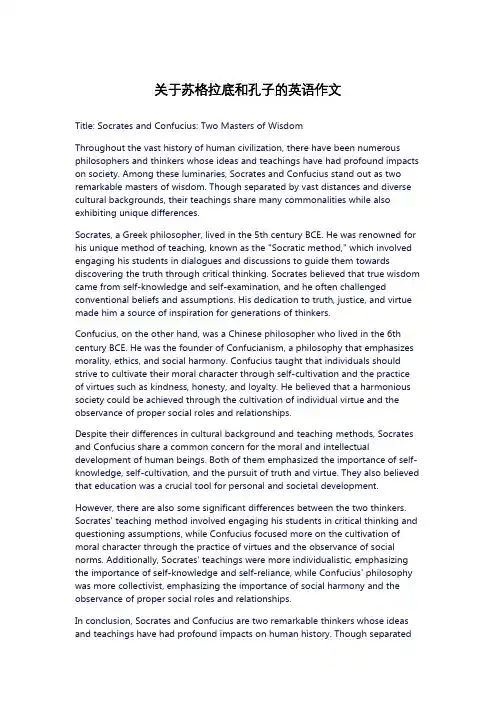
关于苏格拉底和孔子的英语作文Title: Socrates and Confucius: Two Masters of WisdomThroughout the vast history of human civilization, there have been numerous philosophers and thinkers whose ideas and teachings have had profound impacts on society. Among these luminaries, Socrates and Confucius stand out as two remarkable masters of wisdom. Though separated by vast distances and diverse cultural backgrounds, their teachings share many commonalities while also exhibiting unique differences.Socrates, a Greek philosopher, lived in the 5th century BCE. He was renowned for his unique method of teaching, known as the "Socratic method," which involved engaging his students in dialogues and discussions to guide them towards discovering the truth through critical thinking. Socrates believed that true wisdom came from self-knowledge and self-examination, and he often challenged conventional beliefs and assumptions. His dedication to truth, justice, and virtue made him a source of inspiration for generations of thinkers.Confucius, on the other hand, was a Chinese philosopher who lived in the 6th century BCE. He was the founder of Confucianism, a philosophy that emphasizes morality, ethics, and social harmony. Confucius taught that individuals should strive to cultivate their moral character through self-cultivation and the practice of virtues such as kindness, honesty, and loyalty. He believed that a harmonious society could be achieved through the cultivation of individual virtue and the observance of proper social roles and relationships.Despite their differences in cultural background and teaching methods, Socrates and Confucius share a common concern for the moral and intellectual development of human beings. Both of them emphasized the importance of self-knowledge, self-cultivation, and the pursuit of truth and virtue. They also believed that education was a crucial tool for personal and societal development. However, there are also some significant differences between the two thinkers. Socrates' teaching method involved engaging his students in critical thinking and questioning assumptions, while Confucius focused more on the cultivation of moral character through the practice of virtues and the observance of social norms. Additionally, Socrates' teachings were more individualistic, emphasizing the importance of self-knowledge and self-reliance, while Confucius' philosophy was more collectivist, emphasizing the importance of social harmony and the observance of proper social roles and relationships.In conclusion, Socrates and Confucius are two remarkable thinkers whose ideas and teachings have had profound impacts on human history. Though separatedby vast distances and diverse cultural backgrounds, their shared concern for moral and intellectual development, as well as their unique insights into human nature and society, make them invaluable sources of wisdom for all ages.。
When Socrates Meets ConfuciusIt is universally acknowledged that Socrates, the great ancient Greek philosopher, has imposed profound and far-reaching influence on the world with his ideas in education, moralizing and politics while Confucius, kind of Socrates’s counterpart in ancient China, is regarded as the greatest sage whose ideas have laid the foundation for Chinese thinking pattern. And since they were both fond of traveling around the county to advocate their thoughts and ideas, there could be a chance that Socrates traveled to ancient China and came across Confucius who was teaching his students, then two great minds met and discussed about their ideas of education.The most possible matter they may discuss is the ideal teaching method, also the one they were practicing. Socrates introduced Maieutics or Socratic Method to Confucius, and he insisted that every man has got his innate knowledge in his mind which is just like the baby in a pregnant woman’s body, and the teachers’ work is supposed to be help the students to give birth to that innate knowledge. In other words, he made conversations with the students to arouse the hidden knowledge in their minds by asking questions to make them aware of their ignorance and leading them to find the truth. And judging Confucius’s way of teaching by this standard, Socrates criticized Confucius for telling the students what’s true directly sometimes. Then Confucius would answer him withone sentence,” I would not give any guidance to them until they reach to the point that they must figure out it; I would not inspire of enlighten them if it isn’t that they have understood it but can’t express it correctly and completely; I would give them no more examples if they can’t draw inferences about other cases from one instance ”. Here, both of them focus on enlightenment. Socratic Method is based on the presumption the students acquire knowledge in the very way he has assumed, i.e. like pregnant women giving birth to babies, but actually students acquire knowledge in various ways, we can’t simply imagine or take it as granted that they all learn things in the same way, and treat them with one teaching strategy.And that brings them to the next question--educating students in accordance with their aptitude and cognitive rules.Confucius started by tell one example: both his students Zilu and Ranyou came to ask him that when they heard something whether they should put it into practice immediately, and he told Zilu not to practice it while he encouraged Ranyou to do it. He explained that Zilu was an adventurous man, so I told him to be cautious, but Ranyou was a little timid, so I encouraged him. Confucius pointed out that he got to know his students better though observing them and talking with them, and then he gave guidance to them according to his understanding of their aptitude. And when Socrates wanted to justify himself by saying that his Maieutics didhelp to arouse the students’innate intelligence, Confucius could make him speechless by asking,"what if the student shakes his head in answer to all questions? You still don’t give him a clue?"Indeed, different students follow the different cognitive pattern when they approach the world around them. Today we have many different theories with regard to the human cognition such as Theory of Tabula Rasa and Constructivism, we can not tell which one is right or wrong, because the only way to judge them is whether it is suitable for the individuals. Teachers in the modern society should bear in mind that there is no fixed teaching method, so we should apply flexibly different teaching methods to deal with different students based on an in-depth understanding of their cognitive style.。
When Socrates Meets ConfuciusI believe that many people are not sure what will happen if Socrates and Confucius meet at the same time. Both Socrates and Confucius are outstanding in their philosophy of human beings. Perhaps there are many similarities and differences between them, but I am more interested in their perspective in education. Now let me use an example.If Socrates and Confucius were participating in the skills competition for teachers in Sichuan province.Confucius was asked by a student judge,“if a man is drowning , I save him .Then his families will prepare to send me a head of cattle, and should I accept it or not? " Confucius answered him, "You should accept. After saving him, what will his families think about this? and then what will they do? "The judge replied, "they will appreciate me and then would give me something to express their gratitude to me.” Confucius said:"You accept her gifts and what do other people will think about this? and then how will you deal with it? "The judge added, "everyone can see my rewards and it will raise the enthusiasm of rescuing others, and later on seeing a man drowning, they will rush to rescue him. “Confucius nodded.The student judge put the same question to ask the other teacher,Socrates. Socrates asked him, "What is your own opinion? and why do you think so? "The student replied, "it is wrong to receive people's gifts because saving others is a good deed .After all, receiving other people's stuff is not my intention"."What you say does make sense."Socrates said. The student went on to say," but I think I should regard it as our duty, and in this case will everyone know the importance of saving others and volunteer to do this. "Socrates clapped to praise him.From the conversation mentioned above, it is observed that Confucius' heuristic methods of teaching is so practical to enlighten students. He proposes that students should learn and think organically, acquire knowledge independently, and develop cognitive abilities. That is a prominent feature in his teaching process.However, when Socrates is teaching, he likes keeping students putting forward various questions by their own. When his students are unable to come up with the correct answers to the questions, he was not anxious to correct mistakes. Instead, he asks a question in reply to the mistakes so that they become more pronounced and students are trapped into a confusing situation. Then the students think there issomething that turns out to be wrong or flawed, which makes their original ideas disintegrate completely.Needless to say, it will be more significant if we could integrate Confucius 'and Socrates’methods with each other and finally establish a new and all-embracing one during global times. However, one of the indispensable prerequisites for this integration is that we ought to discern the similarities and differences between them carefully and then ascertain their spirits and distinctive advantages and disadvantages in practice. Therefore, when Socrates Meets Confucius, they are likely to collaborate to manage a school well. Do you think so?。
大学演讲稿当苏格拉底遇上孔子(样例5)优秀5篇篇一:当苏格拉底遇上孔子的一分钟自我介绍和3分钟演讲稿篇一Honorable judges ,ladies and gentlemen:Good afternoon. I am glad to be here for this speech contest. First let me introduce myself. My name is Chen Huiting.I am, from Jiangmen and 20 now. I am major in Human Resource Management 。
I am a extrovert.In my spare time, I prefer to stay alone rather than go out with my friends. In the weekend, I always kill time by reading, watching movies and listening to music. Although my favorite singer is P!nk and NichoIas Sparks’ book takes most room of my bookshelf, it doesn’t mean that I don’t read or listen or watch others’ wroks.Because from my view, in order to broaden my horizon is to know different kinds of works.自我介绍:中午好。
我很兴奋在这里演讲竞赛。
首先让我介绍一下我自己。
我的名字是陈慧婷。
我来自江门,我现在20了。
我是人力资源管理专业。
我是一特性特别向的人,但在我的业余时间,我喜爱一个人独处而不是和我的挚友出去。
孔子和苏格拉底的比较英文作文When comparing Confucius and Socrates, two of the most renowned philosophers in history, it is fascinating to explore the similarities and differences between their teachings, beliefs, and impacts on society.Both Confucius and Socrates were influential figures who lived in different times and places but shared a common goal of seeking knowledge, wisdom, and virtue to improve society. Confucius, a Chinese philosopher who lived during the Spring and Autumn period of ancient China, emphasized the importance of moral values, filial piety, and social harmony. He believed in the power of education, self-cultivation, and ethical conduct to create a harmonious society.On the other hand, Socrates, an ancient Greek philosopher who lived in Athens during the Classical period, focused on the pursuit of truth, self-knowledge, andcritical thinking. He is famous for his method ofquestioning, known as the Socratic method, which aimed to stimulate critical thinking, self-reflection, and thesearch for truth. Socrates believed that knowledge was the key to living a virtuous life and that true wisdom comes from admitting one's ignorance.While Confucius and Socrates had different cultural backgrounds and philosophical approaches, they both shareda deep commitment to ethical values, the importance ofself-improvement, and the belief in the power of educationto transform individuals and society. Both philosophers believed in the importance of moral integrity, self-discipline, and the pursuit of knowledge as a way toachieve personal growth and social harmony.Despite their similarities, Confucius and Socrates also had some differences in their philosophical teachings. Confucius focused more on social ethics, family values, and the role of individuals in society, while Socrates emphasized the importance of self-examination, critical thinking, and the pursuit of truth through rational inquiry.Confucius' teachings were more practical and focused on social harmony, while Socrates' philosophy was moreabstract and intellectual, centered on the quest for knowledge and self-understanding.In conclusion, while Confucius and Socrates came from different cultural backgrounds and philosophical traditions, they both made significant contributions to the development of ethical philosophy, moral values, and the pursuit of knowledge. Their teachings continue to inspire andinfluence people around the world, reminding us of the timeless importance of wisdom, virtue, and self-improvement in our lives. By studying the lives and teachings of Confucius and Socrates, we can gain valuable insights into the human quest for truth, wisdom, and moral excellence.。
When Confucius meet SocratesIn reality, it’s impossible that Confucius could meet Socrates. They were in different places and different times. But in other way I can say that they could meet each other. So you want to know why? Don’t worry, I will give you the answer later on.First let’s talk about their similarity . They both lived in an age when people in their countries lived a hard life. So they both concentrated on saving the people and countries. Their ideas were both about we human ourselves. Socrates once said: Know yourself. He believed natural philosophy was not useful for helping the country. People just need to learn about themselves. At the same time, Confucius put up the “ritual”. Ritual was the core of the Confucianism . People should love each other and the governor should love his people. After all, morality was the very thing they all pay attention to.In education, they both had a useful way. Socrates did not directly teach his students, he just asked them questions. By answering his questions, their students just gain the knowledge by themselves. It’s really amazing, is n’t it? Confucius had the same idea. He let students think about the questions by their own. He just inspired and enlighten them. As we can see, they are great artist in teaching.And then let’s talk about their differences. Generally speaking, Socrates emphasized the individual. Confucius cares about the community. Socrates said that everyone should cares more about oneself, not the emperor. This idea was called individualism. We know that today, in western schools, teachers let student to think of the question by their own. Teachers just allow students to think independently and draw their own conclusion. That’s exactly what Socrates want to do. But Confucius said that people should be most respectful to their governor, the community was more important than the individual. It was called collectivism, it had greatly influenced China for thousand of years.So why could Socrates and Confucius meet each other? Socrates’ idea was the origin of western thoughts. Confucius’ idea was the origin of eastern. They were both great, they both had deep love for their people. Although they were different in some ways, they had one thing in common----we human are the most important. Through this idea, they were able to communicate with each other.So it really happened. We fight against each other, we talk with each other and now we communicate and learn from each other. It really seems that it is arranged. They are all great people, and in some way they are different. But I believe that their ideas are just the two sides of one coin------they are different, but they are meaningful and they have something in common.。
When Socrates meets confuciasHello, everybody, I’m happy to be here, today the topic is about When Socrates meets confucia回望学习高中的历史,我们知道苏格拉底是第一位出生在雅典的教育家,他的一生都在从事教育工作,被一种强烈的使命感召唤,毕生致力于教育事业。
在贯穿一生的教育事业中,他始终坚持的教育思想核心是美德即知识。
而孔子作为中国古代伟大的教育家,更为我们所熟知,他主张仁、义、礼的教育思想,一生都在周游列国,到处讲学。
可见苏格拉底和孔子之间之间有着紧密的联系。
当苏格拉底遇到孔夫子,会发生什么呢?在座的一定有着各种各样的想法,在我看来,苏格拉底要是能与孔夫子相遇,那肯定碰撞出很多有趣的故事。
场景一:特邀教育论坛会设想两位相遇在我国特邀教育论坛会,这个论坛只有他们两位是嘉宾。
当教育部长针对目前国内高考的弊端提出要取消高考制度的议题时,他们两位会给出什么样的答案呢?苏格拉底通常采用的方式是,先承认自己一无所知,通过不断提问的方法,来让对方认识到自己的无知,然后抛弃成见,重新展开思考。
而孔子通常会讲:“吾有知乎哉?无知也。
”就是孔子认为自己一无所知,遇到求问,只是叩其两端,以揭开本来就有的答案。
通过对比,我们可以发现这两位教育家虽然在中西方不同文化的背景下,依然有着相似的态度,面对问题,谦虚询问。
场景二:中国西部农村总所周知,中国西部地区教育资源稀缺,尤其是师资力量微薄。
当苏格拉底和孔夫子在西部农村相遇时,会发生什么呢?回顾历史,我们知道孔子践行者有教无类的教育改革思想,只要是乐于教授教诲的人,他都乐于教育,据记载,孔子的学生中,贫贱出身的占大多数,而苏格拉底也有着相同的教育改革思想,他的学生中等级的层次也不尽相同。
因此当他们相遇在中国西部的农村,面对西部一群因贫困上不起学,却渴望读书的孩子时,他们一定会义不容辞的走上讲台,传授知识。
When socrates meet confucious
Good afternoon . Welcome to the scene of the moot, I'm jane,the monitor for today’s debating contest. It's a great honor for us to invite two heavyweight masters to launch a debate about education.First,let me introduce them ,the positive part is the metaphor for the father of philosophy , Socrates, and the opposite is from China which is the founder of Chinese Confucianism ,confucious.our topic is knowledge comes from the heart or gets by outside. Next, let us enjoy this language storm.
Hello everyone, I am Socrates, my view is knoeledge just comes from our heart.The best person is yourself, know yourself, to know the life. Human’s potential is unlimited, the purpose of education is to stimulate people's potential. There is no absolute truth in the world, so I never told my students the answer to the question,I just proposed it, let them find the answer. it is because of people's creativity and imagination, make the world develop so quickly. so I think the knowledge comes from the heart.
Dear students, I am confucious I believe that knowledge is acquired by the outside world, I am not one who was born in the possession of knowledge; I am one who is fond of antiquity, and earnest in seeking it there.I do not deny that the thinking of innovation, but we need the previous experience, the purpose of education is to inform you of their thinking .Only by standing on the shoulders of giants to see better. so I think knoledge just get from outside. Thank you.
Listen to the great debate of two masters, I believe we will benefit a lot. Educate in realizing corpus society in the character of important role. learning without thinking is useless,thinking without learning is perilous.okay,our debate here is over, thanks to the support and welcome to see next time,goodbye.。